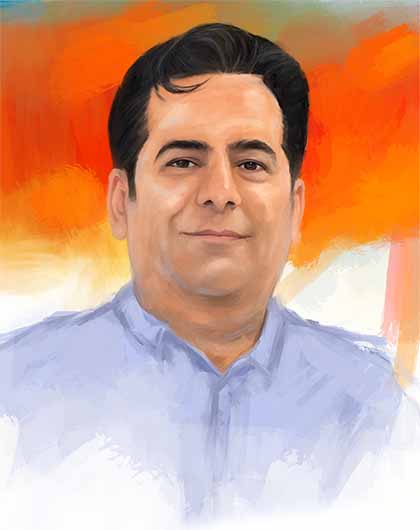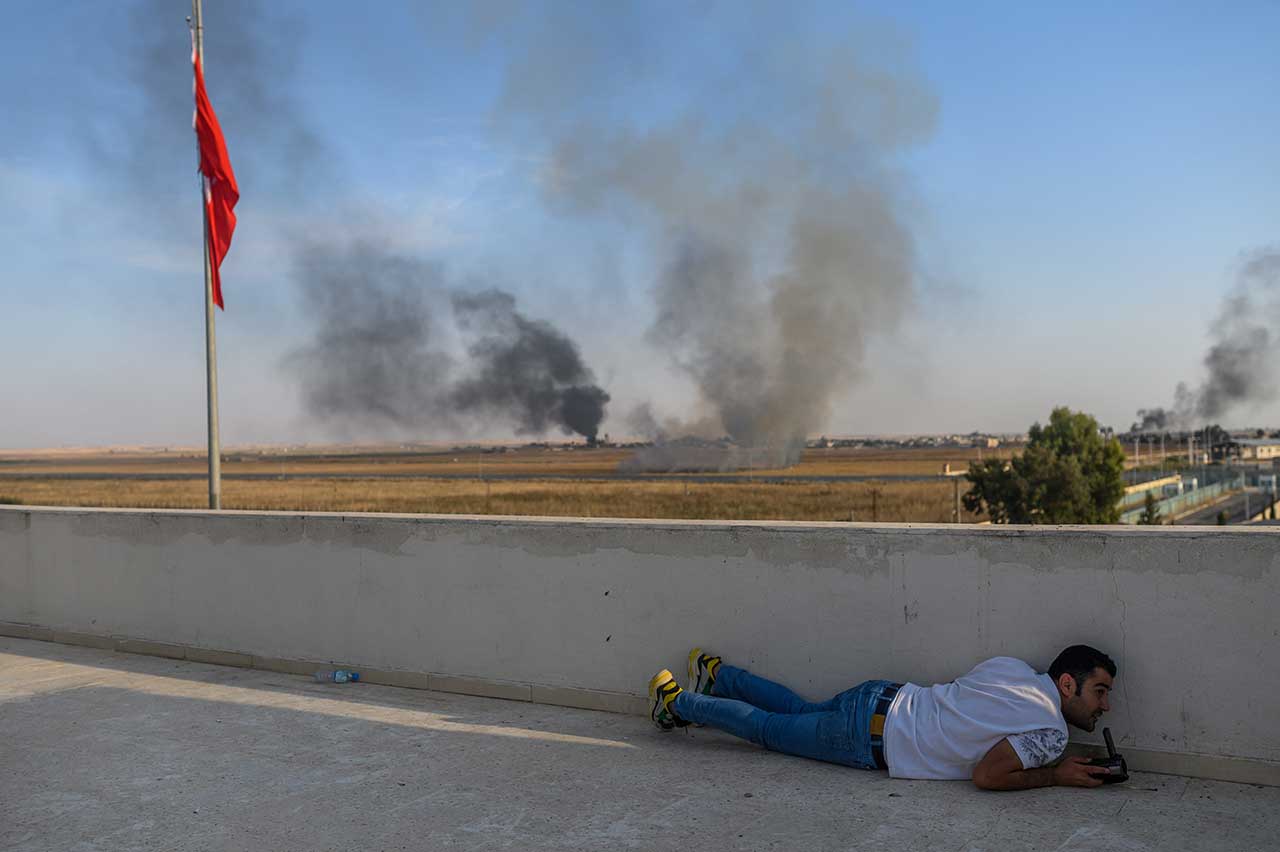
“People of the region now have a voice. This is very important. This is proof of existence. Nobody can deny your existence if you have a voice.”
—Sirwan H. Berko
manager of ARTA FM
(Portrait by Lukman Ahmad | VOA News)
In the northeastern region of Syria known as Rojava, a fragile autonomy exists for Kurds.
It is an unintended but welcome outcome of the U.S. military support for the Kurdish-led Syrian Democratic Forces (SDF) fighting the Islamic State militant group.
Governed by the pro-Kurdish Democratic Union Party (PYD), media have far greater rights than under hardline Syrian ruler Bashar Assad. And while the self-declared autonomy is not officially recognized by the Syrian government or the outside world, Rojava has moved to establish governing bodies.
A media department handles press accreditation, and the Union of Free Media (YRA), a self-described independent body, oversees the emerging media environment.
In a relatively short period, Kurdish news outlets emerged to take advantage of the new media space. But journalists say that newfound freedom still has limits.
Russia
Caspian Sea
Georgia
Black Sea
Armenia
Azerbaijan
Turkey
AZ.
Predominantly
Kurdish
regions
Iran
Syria
Damascus
Baghdad
Iraq
Saudi Arabia
Jordan
Kuwait
Coverage of militancy or the economy is allowed, for instance. But criticism of the PYD or SDF security forces is often off-limits. Journalists who push those boundaries find themselves detained, harassed or attacked, say media analysts and rights groups.
Changes in 2022 to the accreditation process are also viewed with caution.
A new regulation in April mandates YRA membership for any journalist or news outlet applying for the accreditation that is needed to work in the area.
Authorities say it will help improve standards. But critics caution it could be used to further restrict journalists. Some pointed out that the union itself requires members to have at least two years of professional experience, and that the move could grant authorities the power to decide who is or is not a reporter.
The PYD and its forces have also come under criticism over a handful of cases in early 2022 in which a journalist’s credentials were stripped and the license of a large broadcaster was revoked. The latter took place just days after unidentified attackers assaulted its news crew.
Arrests or attacks on media deemed critical serve a dual purpose, says media watchdog Reporters without Borders (RSF). It works both “to silence them and intimidate the others.”
A spokesperson for the regional authorities told VOA that Rojava has a free environment for the press and that any restrictions are a result of a poor security situation.
“I know many media agencies are in the region working and covering all they want. No problem,” Sinam Mohamad, the Washington representative for the Syrian Democratic Council, the political arm of SDF, told VOA via messaging app.
Restrictions eased
The freedom to do journalism is a welcome development after years under Assad.
Before the 2011 protests known as the Arab Spring, the Syrian government denied as many as 300,000 Kurds rights such as citizenship and property ownership and prevented them from attending state schools or owning businesses.
All news was under strict control, and Kurdish-language publications were banned.
At that time, “We did journalism in exile because it was not possible [in Syria]. It was forbidden to exist as a Kurd,” says Sirwan H. Berko, manager at ARTA FM.
That all changed in 2011 when Assad withdrew his forces from Kurdish-held territories to focus on fighting rebel groups.
With Assad’s troops gone, the ban on Kurdish-language books and newspapers was overturned.
Being able to report without pressure or control “was a dream,” said Berko. “This was not possible before. We didn’t exist as the press. We existed only the way Bashar al-Assad’s regime wanted.”
Still, the journalist said, a lack of access to events or areas remains a major problem for journalists in Rojava, even if it is freer than the rest of Syria.
“Some forces act outside of the law. For example, you may have a legal permit to work as a journalist, but when the SDF or the autonomous administration holds a meeting, it allows certain media outlets to cover it while preventing others from doing so,” Berko said.
That is often the case during foreign delegation visits, he said.
Selective access appeared to be in play in January during coverage of an attempted prison break at a facility housing Islamic State militant detainees in the city of Hasakah.
Freelancer Ivan Hasib told VOA that as regional forces sought to secure the facility, a SDF fighter allowed only three media outlets beyond a certain point that allowed them better coverage. All were affiliated with the PYD or SDF, he said.
Party lines
Political affiliation is one of the biggest tensions for media. Nearly all local outlets are aligned with a party.
Each party uses media outlets to some extent to shape public opinion. On the flip side, journalists become targets when tensions between opposition parties flare.
Critics say that the regional authority abuses its power to revoke, suspend or deny permits to news outlets that it deems too critical of the ruling party, particularly those affiliated with other Kurdish parties, including some in Iraqi Kurdistan.
In July 2021, for instance, officials revoked the work permit for Kurdistan24 in Syria.
The media department of the regional authority alleged that the channel, which is affiliated with the ruling Kurdish party in neighboring Iraq, was “inciting hatred, Kurd-Kurd fighting, [and] striking the social fabric and unity in the region,” but it did not point to specific broadcasts.
And early in 2022, authorities revoked the license of Iraqi Kurdish broadcaster Rudaw, one of the biggest stations in the region.
The outlet, reported to be affiliated with the leader of Iraqi Kurdistan, said the move appeared to be “a political decision.”
The decision came in February, shortly after assailants beat a news crew from Rudaw while the journalists were covering a funeral for SDF fighters in Qamishli. The attackers wore military uniforms but did not appear to be members of the local security forces or police, the station said.
Rudaw reported the attack, but, the station says, instead of searching for the perpetrators, the Rojava administration suspended the station’s license.
The network was suspended for reporting deemed to be “spreading hatred” and “unfairly portraying” the autonomous administration.

A journalist takes cover in Akcakale near the Turkish border with Syria on October 10, 2019, as a mortar landed nearby, on the second day of Turkey's military operation against Kurdish forces. (Bluent Kilic | AFP)
Attackers also targeted the station’s newsrooms. In October 2021, Rudaw aired security camera footage showing two masked individuals setting fire to its bureau in the city of Qamishli.
Rojava authorities promised to investigate.
But Nima Nabaz, a spokesperson for Rudaw, told VOA, “We have never been informed about the results of their investigations.”
Nabaz added that it was not clear why her channel was attacked.
Hemin Lihony, a senior manager at Rudaw, told VOA in October that the license remains revoked and a year later, they still have not had updates about the attack.
“We became an alternative to the dominant PYD-affiliated media there,” said Lihony. “The authorities were not happy with that.”
Editor’s note: The reporter of this article previously worked for Rudaw.
Even with the risk of attack or harassment, Rojava journalists believe their freedom to report is helping the region establish independence.
And there is plenty to cover: the fight against the Islamic State group, renewed threats of an attack by Turkish forces and the economy.
For Berko, journalists in the Kurdish region have a greater degree of freedom than in the rest of Syria — a situation that he believes will help Kurds move toward greater stability.
“People of the region now have a voice,” he said. “This is very important. This is proof of existence. Nobody can deny your existence if you have a voice.”
Sirwan Kajjo contributed to this story.